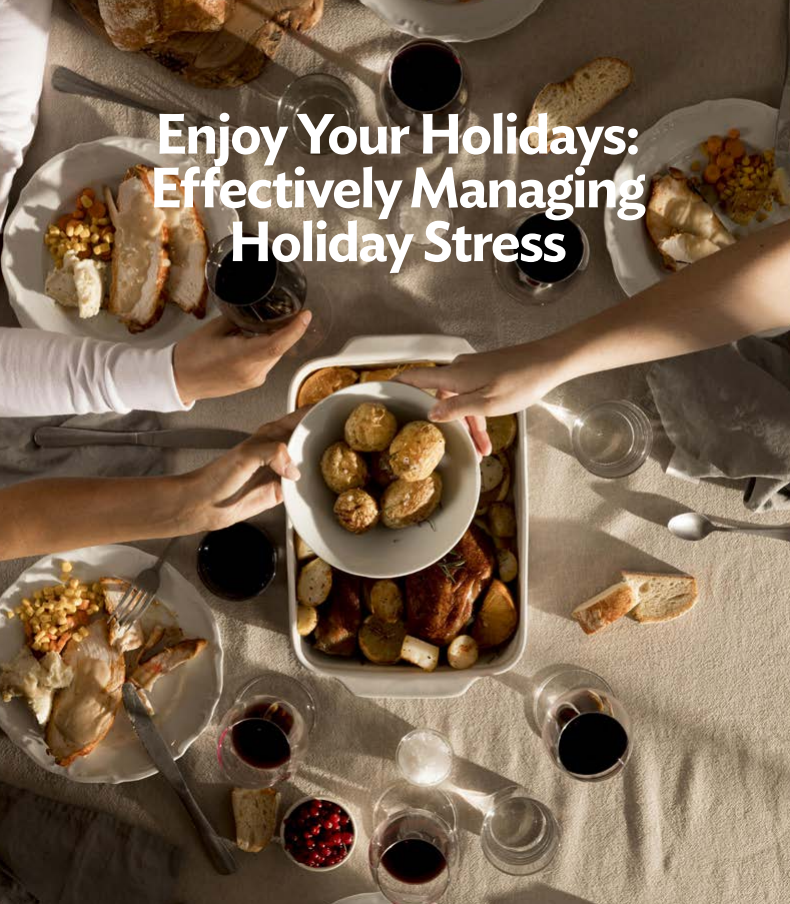
*This is an article from the Winter 2023-24 issue of Contentment Magazine.
By Josh Briley, PhD, FAIS
For many people, their attitude toward the holidays is aptly summed up in Billy Crystal’s quote from When Harry Met Sally, “Boy the holidays are rough. Every year I try to get from the day before Thanksgiving to the day after New Years.”1 This movie was released in 1989, and neither our daily lives nor the holidays have gotten easier during the past almost 25 years.
According to the most recent Gallup Global Emotions report,2 the Negative Experience Index remained at record highs for the second consecutive year. This means record numbers of people reported having some type of negative experience (worry, sadness, anger, stress, or pain) on the day before answering the survey. Forty-one percent of adults worldwide reported experiencing worry, and forty percent reported experiencing stress. In other words, on a typical day, almost half of the world’s population has some type of unpleasant emotion related to stress.
The results of this poll highlight the magnitude of the stress we feel in our daily lives. One way to think about feeling stressed is when we believe we do not have the resources to meet demands. Often, we feel we do not have enough time, energy, money, or emotional capacity to successfully accomplish all the things we need or want to do. The result is feeling stressed. Simply enduring this stress, rather than managing it effectively, saps a person’s remaining physical and emotional resources, which decreases the resources available to meet new and existing demands, and thus potentially starts a downward spiral.
The holiday season, while intended to be a time of contentment and enjoyment, is often anything but. There are specific and unique demands placed upon us at this time of year, that if not managed appropriately, can further exacerbate the downward spiral described above. These demands come at us from almost every aspect of our lives. As a result, rather than having fun with our family and friends, we are more likely to lose our tempers, feel rushed and anxious, and even begin to dread not only each individual event, but also the holidays as a whole.
In this article, we will examine some of these unique stressors and explore methods to effectively manage holiday stress. These are not methods of eliminating the stress from these demands, that is not a feasible goal. The techniques in this article are not intended to replace any positive stress management techniques you may already practice. You should continue engaging in these practices, and possibly even utilize them more frequently, during the holiday season. The techniques in this article are designed to supplement any healthy stress management techniques you currently utilize. If you do not regularly practice healthy stress management, these techniques can be a good starting point to building a more comprehensive and effective method of managing stress in your daily life.
Note, the holidays are not a time to initiate stress management techniques that require significant time and effort, such as beginning a new exercise regime or a new diet plan. While such changes are necessary to maximize managing the normal, daily stress we experience, trying to initiate significantly new behaviors and habits during the holiday season only adds to the already overwhelming stress most of us experience during this time of the year. Rather, use this time to plan for such changes when the New Year begins.
Let’s explore some of the unique, or exacerbated, stressors related to the holidays. We will discuss some of the specific stressors we all typically encounter, which may individually or collectively contribute to feeling overly stressed and interfere with our ability to enjoy the holidays. Then, we will discuss some common sense, but not necessarily simple, approaches to effectively managing holiday stress.
Crowds
Holiday activities mean more people are out more often. Whether you are at a restaurant, shopping, or traveling, there are significantly more people engaged in the same activity at the same time. The result is that available resources are overwhelmed, leading to longer wait times, reduced availability of items, and possibly even less room to move about in. As a result, both customers and employees often feel impatient as if they have little or no control over the situation. This combination of factors results in a “powder keg” of irritability, anger, and frustration that most often is unleashed in full in response to a relatively insignificant stressor. The resulting conflicts not only add to the tension in already stressful situations, but also increase the wait times of other customers and perpetuate the cycle of impatience and frustration.
Traffic and Travel
Related to the crowds that are prolific during the holidays, traffic congestion is also significantly increased, especially around large shopping centers. But traffic congestion is also increased during holiday travel, whether it is on the highways for road trips or in airports. Traffic jams contribute to the same sense of impatience discussed above, and the constant honking from frustrated and irate drivers adds to the cacophony, and therefore the environmental stress, of the holidays. As a result, “road rage” is more likely, leading to more aggressive driving that may cause further traffic difficulties.
Additionally, inclement weather can have an adverse impact on travel. Driving can become difficult, if not dangerous, due to unexpected inclement weather or storms that were more severe than anticipated. Inclement weather can also cause flight delays or cancellations. Weather conditions can result in travel delays, unplanned overnight stops, or even damage to a vehicle or injury from an accident. Weather is something that is out of our control, and dealing with the increased difficulties caused by inclement weather can have a negative impact on our mood and attitude surrounding the holidays.
Holiday Activities and Celebrations
The holidays are a busy time of the year. In addition to the shopping and arrangements for travel discussed above, there are activities that are unique to this time of year that add to the already busy schedules of our lives. There are holiday parties for work, and in households with two or more incomes, there may be parties for each job. Not to mention holiday parties at our kids’ schools, the programs schools or churches may put on that require additional time for rehearsals if we are participating in them. Friends and families may gather for celebrations that require not only time to attend, but often for us to prepare food to bring to the gathering. These additional obligations, while hopefully enjoyable, contribute to a sense of being overwhelmed and too busy during the holidays.

Finances
The holidays are expensive. We buy gifts for our children, our spouses, parents, family members, coworkers, and friends. We may buy specialty themed clothing for parties or perhaps matching outfits for holiday photos or family traditions. We buy groceries for large family dinners, food for holiday parties, and may eat at restaurants more often due to the increased demands on time for shopping and holiday activities. There are also the additional financial aspects of travel that was mentioned earlier. The financial stress of the holidays can negatively impact not only our enjoyment of the season, but it is also a stressor that can reverberate throughout the year as we attempt to climb out of any financial situation that may have arisen because of the holidays.
Health and Physical Stress
The increased level of activity, celebrations, travel, and time spent in crowded situations has a toll on our physical wellbeing during the holidays. Often, when we have overscheduled ourselves, the first aspects of self-care that get set aside are sleep and nutrition. Because we have so many things to do and no additional time to do them, you may notice that you are staying up later and/or getting out of bed earlier in the mornings to try to accomplish everything. The busier than usual schedules leave little time for healthy meal preparation, and holiday parties rarely have healthy food choices. Therefore, during the holidays we are more likely to eat foods that are high in fat, sugar, and calorie content, but low in nutritional value. Due to holiday meals and other celebrations, as well as “stress eating,” we may also consume more of these unhealthy food options than normal. This pattern of overeating high calorie, low nutritional foods results in feelings of bloating, fatigue, emotional instability, and a general malaise.
In addition, people may tend to drink more heavily than usual at holiday parties or as a coping mechanism for the stressors we have discussed above. As a result, they are likely to feel the negative impact the next day (hangover) or lead to problematic levels of alcohol consumption. Alcohol may not be the only substance abused more frequently during the holidays. As more people are turning to substances such as marijuana (either legally obtained or not), and other illicit or prescribed medications, the adverse effects of such substance abuse negatively impact their daily functioning. Frighteningly, often the person abusing the substances is unaware of the extent of the negative impact on their lives, and loved ones are reluctant to address the topic with them.
Due partially to the decrease in quality sleep and nutrition, the use of substances to celebrate at holiday parties or as a coping mechanism, but also due to being in crowds of people more often during the holiday season, physical illnesses such as the common cold, the flu, COVID, and others seem to be more prevalent during this time of year. Often, instead of heeding the illness and getting some rest for a few days, we “push on” and work from home, continue trying to accomplish everything we need for the holiday season, and further exacerbate the physical stress on our bodies.
Expectations
The stressors we have discussed so far in this article are, for the most part, beyond our control. We can manage the stress and stressors, as we will discuss techniques for doing so in the next part of this article, but these stressors are, for the most part, unavoidable. The one stressor that is completely avoidable, and yet probably the most intense stressor for many during the holiday season, is the expectations we put on ourselves, our loved ones, and others to have the “perfect” holiday. More than any other time of the year, traditions are emphasized and treated with an almost sacred reverence. New trends are quickly adopted in the fear of “missing out” or not giving our children the same experiences as their classmates.
We remember the holidays of our childhood with rose colored glasses, remembering everything as going smoothly, the food being perfect, the presents neatly wrapped and labeled, and everything looking like a Hallmark movie. In reality, it is highly unlikely any part of our childhood holidays was as idealistic as we remember. But we put unnecessary pressure on ourselves to try to recreate these unrealistically idyllic holidays. Or, quite the opposite, we remember very conflictual, stressful holidays with dysfunctional family members, and we put undue pressure on ourselves to ensure our children’s holiday memories are happier.
Managing the Additional Stress of the Holidays
Any of the aspects of holiday stress discussed above would significantly add to stress levels. When these stressors are combined, our ability to manage the additional stress can be significantly compromised. However, it is possible to establish a stress management plan with approaches that can be done before the additional stressors of the holidays begin, during the midst of the holiday chaos, and finally at the end of the holidays. These approaches may supplement any healthy stress management techniques you practice in your daily life. However, these commonsense approaches are good to implement even if you do not have a current healthy stress management regimen. 
Plan Ahead
Most people are familiar with the saying, “If you fail to plan, you plan to fail.” This logic can be applied to approaching the holiday season. As chaotic as the holidays can be, many of us engage in roughly the same activities every year and can plan for them. Making a plan and sticking with it regarding finances, scheduling, the effort you are able to expend for each activity, and even how much you will eat and drink at celebrations, will alleviate much of the stressors discussed above before the season even begins. Decide ahead of time how much money you can spend on the additional demands for the holidays, including gifts, contributions to celebrations, groceries for meals, and budget accordingly. Similarly schedule the time needed for each task to be completed. Give yourself extra time to deal with traffic congestion, crowds, and unexpected inclement weather. If you are planning to travel, get to the airport early to give yourself time to comfortably navigate through the crowds at the check-in, at security, and at the gate. Plan games to play, download movies and shows to watch, or take something to read to help make the time you are waiting more enjoyable. Similarly, if taking a road trip, plan additional time to accommodate unpredictable obstacles such as traffic congestion, inclement weather, and construction. Planning for this additional time helps eliminate the stress of worrying about whether you will “make it,” and thus helps you enjoy the holiday activities, instead of trying to rush through them. Also, develop a strategy regarding celebrations that allow you to enjoy yourself, while not overdoing it.
Finally, manage expectations regarding holiday plans. What traditions are important for your family to continue? Are there any that typically cause stress and frustration that can be retired or replaced? What activities can be delegated to other family members? What tasks can be substituted with easier to accomplish goals? For example, if you do not have time to bake homemade cookies for your children’s holiday parties, check into local bakeries that can deliver the homemade taste and texture without spending hours in the kitchen that you may not have. Obviously, saving this time will mean an additional financial expenditure that should be budgeted for, and striking a balance in budgeting time and finances is especially important during the holidays. 
Manage in the Midst
Once you have a strong plan for managing your time, finances, celebrations, and other obligations, it is important to stick to it, with some degree of flexibility. The unexpected occurs, and being able to adapt and adjust to changing situations is important. In the midst of the holiday chaos, things often feel out of control, and it is easy to become overwhelmed and upset. But one thing you can control is what you choose to give your attention to. It is easy to get swept up and overwhelmed by everyone hustling for a spot in traffic, or people complaining about the wait times in line, or the people who are being rude and selfish. Focusing on such things will only serve to exacerbate your own sense of frustration and impatience and increase the stress you feel. Instead, deliberately look for the good. Find the couple that are laughing and smiling in their conversation together, the children who are being polite and helpful to their parents and other adults, the employee who greets each customer with a genuine smile. Listen closely to the holiday music and the cheerful melodies and lyrics, maybe even hum or sing along quietly. Make it a practice to pleasantly greet everyone you encounter, you never know when a sincere kind word can make someone’s day, and as a bonus, you will feel more joy yourself.
If you feel yourself becoming upset, anxious, or impatient, take a moment to decompress. Take a few slow, deep breaths to calm your heart rate slightly. Ground yourself by looking around and focusing on enjoyable things such as those described above. Engage your senses, look at the holiday decorations around you, listen to the music, smell the candles and other holiday aromas, maybe you have a hot beverage that you can feel the warmth of and enjoy the flavor.
Finally, check your attitude. We rarely respond to the actual events around us. Rather, we respond to our interpretation of the events around us and to our mood. For example, you can sit in congested traffic and allow yourself to get angry at the idiots on the road that cannot drive. Or you can use the time to have a conversation with those in the car with you, listen to your favorite songs, make more progress in the podcast or audiobook you may be listening to, or simply turn off what you have been listening to and take a few moments of relative quiet and allow yourself to decompress. Learning to be flexible in handling the stressors of the holidays is one of the most important factors in successfully managing holiday stress. A favorite saying of mine when working with clients, or to remind myself, is that the things that go wrong are the funny stories you tell later. Therefore, when the unexpected happens that has a negative impact on my plans, I start mentally rehearsing how I will tell the story later and trying to see the humor in the situation. This approach almost always changes my mood.
After the Holidays
Assessing how the holidays went and how well your plan worked is important. Be honest with yourself, in which areas have you done well and in which areas did things go awry? It is important to be gentle with yourself during this assessment. This exercise is not to criticize yourself for what did not go as planned, but to see where you succeeded in better managing your holiday stress and where you need to make improvements for next year. This is also a good time to review your overall stress management system and make plans to implement a healthy strategy for managing stress or improving your current strategy. If you find the increased stressors of the holiday are easily overwhelming you, or old difficulties have been brought to light, then reach out to a qualified professional for help in coping with these struggles.
Navigating the holiday season is fraught with potential stressors that are either unique to this time of year or are exacerbated. However, the stressors do not have to steal the joy we want from celebrating time with friends and family. Planning ahead and budgeting finances, time, and effort, looking for good things that are happening all around us rather than focusing on the negatives, being flexible and patient with unexpected occurrences, and gently and patiently checking in with yourself to see how you are doing are keys to not just surviving the holidays, but enjoying and thriving in them.
References
- When Harry Met Sally. Directed by Rob Reiner, Columbia Pictures, 1989.
- Gallup Global Emotions Report 2023. Retrieved from https://www.gallup.com/analytics/349280/gallup-global-emotions-report.aspx. October 22, 2023
ABOUT THE AUTHOR

Josh Briley, PhD, BCMAS, FAIS is the Clinical Education Director for Electromedical Products International, Inc., the manufacturer and distributor of Alpha-Stim devices. Dr. Briley is a licensed clinical psychologist who earned his doctorate in clinical psychology in 2003 from the University of North Texas. He began his career at the Federal Bureau of Prisons, where he focused on drug treatment, crisis intervention, and anger management and was quickly appointed leader of the Crisis Support Team and Regional Assistant Team Leader. He went on to work in an outpatient clinic for the Veterans Health Administration specializing in individual and group therapy for PTSD, depression, anxiety, and chronic pain treatment. Dr. Briley has also owned a private practice, taught online undergraduate and graduate level courses, and conducted teletherapy for Betterhelp.com. He is a board member and Fellow of the American Institute of Stress.
Contentment Magazine
The dictionary defines “content” as being in a state of peaceful happiness. The AIS magazine is called Contentment because we want all of our guests and members to find contentment in their lives by learning about stress management and finding what works best for each them. Stress is unavoidable, and comes in many shapes and sizes that makes being in a state of peaceful happiness seem like a very lofty goal. But happiness is easy to find once you are able to find ways to manage your stress and keep a healthy perspective when going though difficult times in life. You will always have stress, but stress does not always have you!

Leave A Comment
You must be logged in to post a comment.